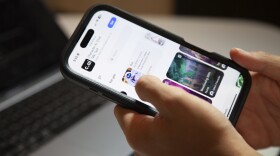Some University of Hawaiʻi faculty members are trying to preserve social media content made by Native Hawaiians. A new $150,000 grant from the Mellon Foundation’s Public Knowledge program is helping to make that possible.
The Kaʻohipōhaku project is made up of a team of librarians and archivists across the UH system who see the importance of Native Hawaiian content on social media. They also know the risk of this content being deleted or disappearing for good, which is all too common.
Alphie Garcia is a technical advisor on the project and the information resources and collection management librarian at UH West Oʻahu. He said almost 4 in 10 webpages can disappear within about 10 years, and 1 in 5 posts on social media platforms, like X or Instagram, can disappear within months.
He said the main goal is to gather discourse on these platforms around the times of significant events. He explained that content created during the Lahaina fire, the Thirty Meter Telescope action, and the Ku Kiaʻi Mauna movement are essential to understanding what was going on during these times. Without a permanent record, they risk being lost.
“That's kind of what we were hoping to see – that ability to go back and look through that material and see what that conversation was at the time,” Garcia said. “If we don't do that, then we run the risk of being completely beholden to big tech, and we've seen the fragility of those relationships. So we want to have an option for these content creators to be able to save their own work, and then from an archivist perspective, to save for posterity.”
The grant from the Mellon Foundation will allow the team to test out different tools to see which is the best fit for holding the massive amount of content they want to save. As of right now, Garcia is working with Browsertrix, which he said looks promising.
One issue is storage. There would be terabytes of data across platforms like X, Instagram, Facebook, Tiktok and Reddit. Garcia said they are weighing the use of a cloud option with Browsertrix versus storing the data locally at UH institutions.
“With the cloud option, we run the risk of potentially losing that service because we run out of grant funds,” Garcia said. “So we could do all this work and then not be able to find alternative funding, all our work would go away. So we’re starting to have conversations with IT people here to see how realistic (storing it locally) could be.”
Garcia added that there are ethical dilemmas to archiving content, like permission and larger consent issues. He worries that there may be people who don’t want to be permanently archived because of risks to their livelihood if the footage shows them engaged in controversial action.
The Kaʻohipōhaku team will work with archivists from the Black Lives Matter movement, who will hopefully help them navigate any of these crossroads.
Another dilemma? Whether or not to store content that contains misinformation pertaining to Hawaiʻi. Garcia pointed to posts that claimed the Lahaina wildfire was started by lasers — a long-running belief held by some.
“It’s like, did archivists from the Black Lives Matter movement choose to store white nationalism content?” he asked. “We’re trying to reflect the reality of these conversations holistically, which includes more controversial takes. But then we have to ask if we’re doing a disservice by trying to preserve that over time. That’s definitely still a question we’re trying to figure out.”






